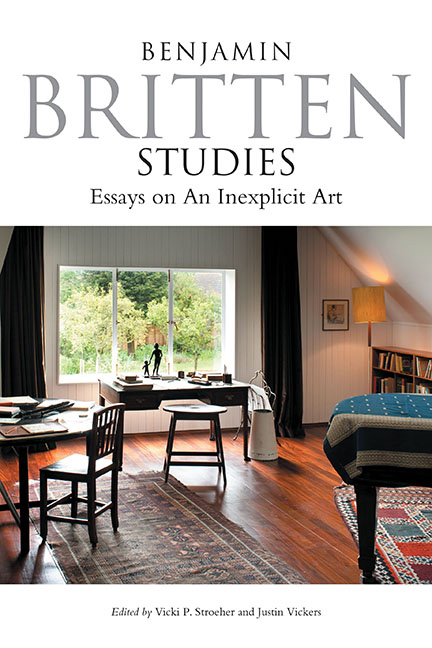Book contents
- Frontmatter
- Dedication
- Epigraph
- Contents
- List of Illustrations
- List of Musical Examples
- List of Tables
- Notes on Contributors
- Acknowledgements
- Bibliographic and General Abbreviations
- Editors’ Preface
- Introduction: Writing About Britten
- Part I Identity: Exile and Return
- Part II Britten and Intimacy
- Part III Britten and His Craft
- Part IV Britten and Matters of Practicality
- 12 Reviving Paul Bunyan
- 13 Striking a Compromise: Britten, British Publishers, Soviet Theaters, and the Premieres of Peter Grimes and The Prince of the Pagodas
- 14 From Boosey & Hawkes to Faber Music: Britten Seeks a “Composer's Place”
- Conclusion and Epilogue
- Works Cited
- Index
13 - Striking a Compromise: Britten, British Publishers, Soviet Theaters, and the Premieres of Peter Grimes and The Prince of the Pagodas
from Part IV - Britten and Matters of Practicality
Published online by Cambridge University Press: 25 October 2017
- Frontmatter
- Dedication
- Epigraph
- Contents
- List of Illustrations
- List of Musical Examples
- List of Tables
- Notes on Contributors
- Acknowledgements
- Bibliographic and General Abbreviations
- Editors’ Preface
- Introduction: Writing About Britten
- Part I Identity: Exile and Return
- Part II Britten and Intimacy
- Part III Britten and His Craft
- Part IV Britten and Matters of Practicality
- 12 Reviving Paul Bunyan
- 13 Striking a Compromise: Britten, British Publishers, Soviet Theaters, and the Premieres of Peter Grimes and The Prince of the Pagodas
- 14 From Boosey & Hawkes to Faber Music: Britten Seeks a “Composer's Place”
- Conclusion and Epilogue
- Works Cited
- Index
Summary
From his first meeting with Mstislav Rostropovich and Dmitri Shostakovich in 1960 to his death in 1976, Britten maintained a close personal connection with Soviet musicians and audiences. In the late 1950s, the Soviet Union and the United Kingdom sought to reduce Cold War tensions by developing cultural exchanges between each other's nations; Britten was a major participant in these exchanges. Britten's biographers have focused primarily on the composer's friendships with prominent Soviet musicians such as Rostropovich and Shostakovich, as well as the pianist Sviatoslav Richter and the soprano Galina Vishnevskaya. In this chapter, I discuss an aspect of Britten's relationship with the Soviet Union that has been largely neglected: the composer's ultimately successful attempts in forging a compromise between his publishers and the Union so that fully staged performances of Peter Grimes, Op. 33 (1945), and The Prince of the Pagodas, Op. 57 (1956), could take place in Leningrad's Kirov Theater.
There are four critical moments that define Britten's attitude toward the Soviet performance of his staged works: Britten's 1961 letter to Hamilton Kerr of the Foreign Office, the Kirov Theater's revival of Peter Grimes in 1965, the Soviet premiere of The Prince of the Pagodas in 1972, and the composer's reaction to the Soviet Union's entrance into the Universal Copyright Convention (UCC) in 1973. In order to reveal a new perspective on these circumstances, I have consulted the composer's unpublished correspondence at the Britten-Pears Foundation Archives in Aldeburgh as well as recently declassified British Foreign Office and Board of Trade documents held by the British National Archives. These documents reveal that Britten forged personal relationships with Soviet musicians to promote performances of his compositions in the Soviet Union, with disregard to the rights issues they would invariably raise with his publisher, Boosey & Hawkes. Acknowledging Britten's efforts to overcome the obstacles resulting from promoting performances of his works in the Soviet Union, the reader may develop a clearer understanding of his priorities concerning cultural exchange during the 1960s and early 1970s.
- Type
- Chapter
- Information
- Benjamin Britten Studies: Essays on An Inexplicit Art , pp. 377 - 404Publisher: Boydell & BrewerPrint publication year: 2017

